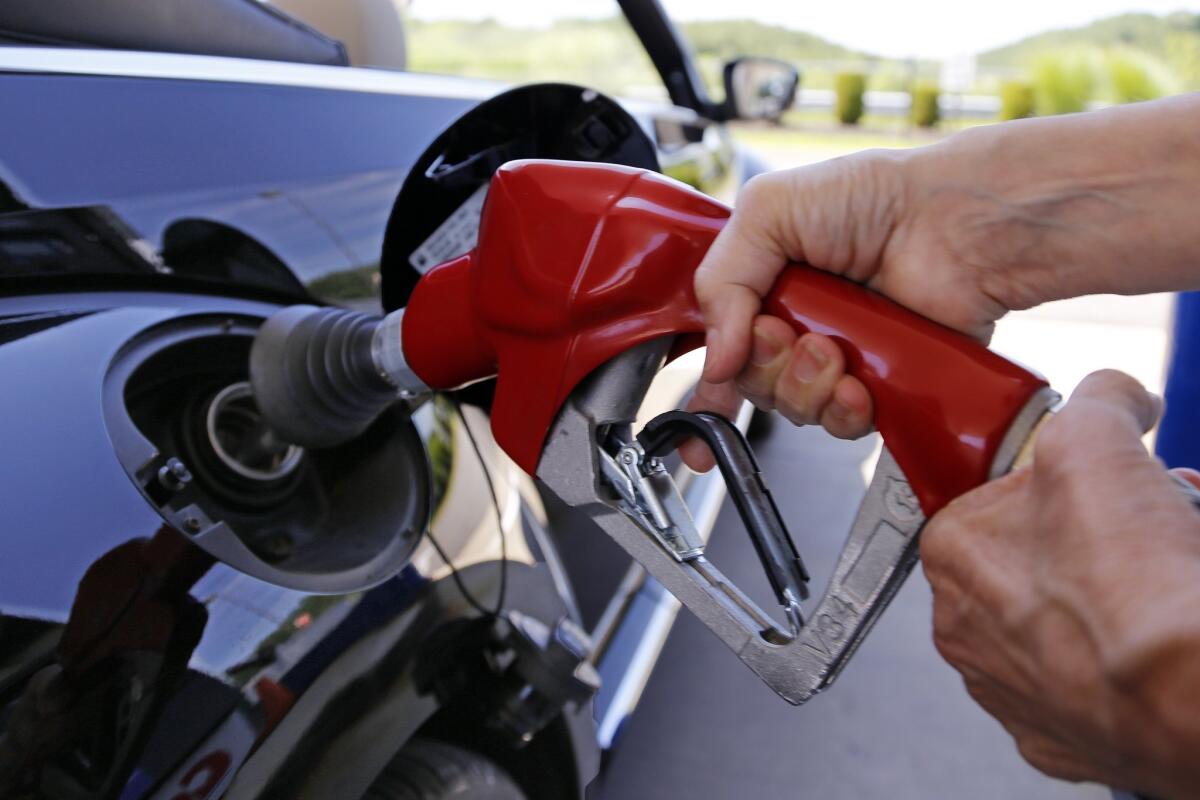Get ready for a bump at the pump in California

California drivers normally catch a bit of a break this time of year, when gas stations switch over to winter blends, which usually run about 12 cents a gallon less than summer-blended fuel.
But this year, the switch will coincide with the rollout of a bill passed earlier this year by the California Legislature and signed into law by Gov. Jerry Brown to increase the price of gasoline by 12 cents a gallon.
In essence, the hike in the gas tax will nullify the reduction in price associated with the transition to winter fuel.
Gas stations in Southern California will be allowed to start selling winter-blended gasoline Wednesday, according to the Weekly Fuel Prices Report released by the Automobile Club of Southern California.
Thatâs the same day the gas tax increase â known as Senate Bill 1, the Road Repair and Accountability Act â goes into effect.
âI donât know if it was calculated this way but it was smart that they did it in the fall when the price is usually lower, as compared to the summer,â said Jeffrey Spring, spokesman for the Auto Club. âItâs probably more palatable that way.â
The Board of Equalization, the agency that oversees tax and fee collection in the state, on Wednesday will adjust the excise tax on gasoline based on projections on consumption and gas prices to 41.7 cents per gallon.
But Spring said that does not mean every gas station in California will instantly increase their prices by 12 cents first thing Wednesday morning.
âItâs not an overnight switch. It doesnât happen like that,â Spring said. âWeâve had gas tax increases before and itâs kind of built into the market beforehand.â
Dave Hackett, president of Stillwater Associates, an Irvine-based transportation energy consulting company, said it may be a good idea for some motorists â especially those who regularly drive long distances â to consider fueling up before Wednesday.
âItâs worth it for some folks,â Hackett said. âIf youâve got one of those awful commutes and you donât live close to where you work, then every time you pay 12 cents a gallon will mean something to you ⌠If you drive all the time this [tax increase] can be a big deal.â
In an effort to reduce air pollution, many states require refineries to produce summer-blend fuels that use different fuel additives. California uses its own unique blend. Summer blends are more expensive because of the oxygenates required in the fuel and because refineries have to briefly shut down before processing it.
For almost three years, drivers have received a break at the pump as gasoline prices have stayed relatively low, thanks to a dramatic drop in crude oil prices that started at the end of 2014.
According to AAA, the average price for regular gasoline on Monday is $3.037 a gallon in California and $3.075 a gallon in Los Angeles.
Thatâs a far cry from October 2012, when Los Angeles drivers paid an average of $4.705 a gallon, the highest ever recorded in the county by AAA.
The 12-cent rise effective Wednesday will mark the first iteration of Senate Bill 1. Its full effect will be felt by July 2019, when the total amount in excise taxes will go up to 47.3 cents a gallon.
Diesel drivers will get hit even harder. The stateâs diesel excise tax will go up 20 cents a gallon and the diesel sales tax will see a 5.75% increase.
Annual vehicle registration fees will also go up between $25 and $175, depending on the value of the car. The tax also establishes a $100 annual registration fee for zero-emission vehicles, starting in July 2020.
Spring said the long-term implications of the gas tax increase vary depending on factors such as the type of vehicle a consumer drives and whether gas prices remain stable.
âAll Californians have been down the path of over 4 bucks a gallon a couple times so thatâs still fresh in most peopleâs memories,â Spring said. âSo if weâre something around $3 [a gallon], I wouldnât say youâre shrugging it off but youâre saying, âHey, Iâve been there.ââ
Signed into law in April, Senate Bill 1 has been controversial.
Supporters say itâs needed to upgrade the stateâs transportation infrastructure. Analysis of the bill said rough roads result in each driver in California spending about $700 a year in extra vehicle repairs.
Republican critics of SB1 say revenue from previous gas tax increases in the past have been diverted to other spending programs. Democrats say measures have been put in place to prevent misuse of the money.
An effort to repeal the tax has been launched.
Before passage of the SB1 gas tax increase, California had the seventh-highest taxes and fees on gasoline in the nation.
At 59.3 cents per gallon, Pennsylvania has the highest gas tax in the nation, according to the Washington-based Tax Foundation.
But by 2019, itâs estimated that California will be just 1 cent behind Pennsylvania, provided that the gas taxes in other states remain the same.
Although they are not technically included in the gas tax, two other fees are imposed in California â the Low Carbon Fuel Standard that adds 3.7 cents per gallon of gasoline and the fee supporting the stateâs cap-and-trade program on carbon emissions that comes to 11.4 cents a gallon.
In addition, the federal government already imposes a gas tax of 18.4 cents a gallon on each state.
More to Read
Inside the business of entertainment
The Wide Shot brings you news, analysis and insights on everything from streaming wars to production â and what it all means for the future.
You may occasionally receive promotional content from the Los Angeles Times.











